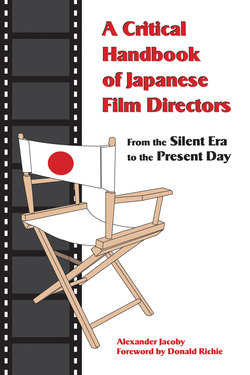Читать книгу A Critical Handbook of Japanese Film Directors - Alexander Jacoby - Страница 13
На сайте Литреса книга снята с продажи.
FUJITA Toshiya
Оглавление(January 16, 1932–August 29, 1997)
藤田敏八
Fujita is ironically best-known in the West for one of his least personal films, the overblown, ultra-violent action movie Lady Snowblood (Shurayuki hime, 1973), which charted a young woman’s quest for revenge on the men who murdered her father and raped her mother. Though featuring a memorably icy star performance from Meiko Kaji and filled with striking color effects, the film was distinctly heavy-handed in approach and barely questioned the eye-for-an-eye morality espoused by its heroine. Its sequel, Lady Snowblood 2: Love Song of Vengeance (Shurayuki hime: Urami renka, 1974), displayed a certain political edge in its examination of class conflicts during the Meiji era, but its analysis was compromised by the crudities of its exploitation format.
Fujita had begun his career working with similar exploitation material at Nikkatsu, where he contributed two installments to the Stray Cat Rock (Nora neko rokku) series. His first major critical success was Wet Sand in August (Hachigatsu no nureta suna, 1971), a melodrama, set on the Shōnan Coast southwest of Tokyo, about the friendships and romances of a group of young people with few hopes for the future. This earned him a reputation for dealing with youthful subjects; after a short period working on Nikkatsu Roman Porno, he returned to the experiences of the young with a series of films in a realist mode. Virgin Blues (Bājin Burūsu, 1974) and Did The Red Bird Escape? (Akai tori nigeta?, 1973) dramatized the generation gap through stories of teenagers who turn to crime and are rejected by their parents. The Red Lantern (Aka chōchin, 1974) depicted a young couple’s fruitless search for a room in Tokyo; Gregory Barrett has argued that the story expressed the younger generation’s “futile attempt to escape from a restrictive society.” Days That Have Passed (Kaerazaru hibi, 1978), an account of the life of a high school boy who returns from Tokyo to his native Nagano after his father’s death, topped the annual Kinema Junpō critics’ poll. Fujita also directed Temptation Angel (Tenshi o yūwaku, 1979), perhaps the best of the several star vehicles for the popular romantic pairing of Momoe Yamaguchi and Tomokazu Miura. Despite occasional stylistic indulgences, it was a warmly observed account of the everyday problems of a young suburban couple, and contained some of the first indications of Miura’s talent as a serious actor.
During the eighties, Fujita made Do the Slow Boogie with Me (Surōna bugi ni shite kure, 1981) for Kadokawa; this was another romantic drama, about the relationship between a girl and a middle-aged man. The Miracle of Joe the Petrel (Umitsubame Jō no kiseki, 1984) melded aspects of the youth film with elements of the crime thriller; it was set among the Manila underworld, and its hero was a half-Okinawan, half-Filipino yakuza. Fujita’s last film as director, Revolver (Riborubā, 1988), charted the lives of various characters connected by a single gun. By this time, Fujita was established as an actor, appearing notably for Seijun Suzuki in Zigeunerweisen (Tsigoineruwaizen, 1980). He continued to act until his death, and, with the exception of Lady Snowblood, is now perhaps best known in the West for his performances. Nevertheless, his realist films of the seventies were well-regarded in their time, and might benefit from wider distribution abroad.
1967 Hikō shōnen: Hinode no sakebi / Bad Boy: Crying at Sunrise
1968 Nippon zeronen / Japan, Year Zero (released in 2002)
1970 Hikō shōnen: Wakamono no toride / Bad Boy: A Young Man’s Stronghold
Nora neko rokku: Wairudo janbo / Stray Cat Rock: Wild Jumbo
Shinjuku autorō: Buttobase / Shinjuku Outlaw: Send It Flying
1971 Nora neko rokku: Bōsōshūdan ’71 / Stray Cat Rock: Motorcycle Gang ’71
Hachigatsu no nureta suna / Wet Sand in August
1972 Hachigatsu wa Erosu no nioi / The Summer Affair / Scent of Eros in August (lit.)
Erosu no yūwaku / Seduction of Eros
1973 Akai tori nigeta? / Did the Red Bird Escape?
Erosu wa amaki kaori / Eros Smells Sweet
Shurayuki hime / Lady Snowblood
1974 Aka chōchin / The Red Lantern
Shurayuki hime: Urami renka / Lady Snowblood 2: Love Song of Vengeance
Imōto / Younger Sister
Bājin burūsu / Virgin Blues
Honoo no shōzō / Portrait of Flame
1975 Hadashi no burūjin / Barefoot in Blue Jeans
1977 Yokosuka otokogari: Shōjo: Etsuraku / Yokosuka Manhunt: Young Girl: Pleasure
Jitsuroku furyō shōjo / Confessions of a Teenage Mother (lit. True Record of a Delinquent Girl)
1978 Kikenna kankei / Dangerous Liaisons
Kaerazaru hibi / Days That Have Passed / Bittersweet
1979 Motto shinayaka ni, motto shitataka ni / Smoother and Harder
Jūhassai, umi e / 18-Year-Old, To the Sea
Tenshi o yūwaku / Temptation Angel
1981 Surōna bugi ni shite kure / Do the Slow Boogie with Me
1982 Daiamondo wa kizu tsukanai / Diamonds Don’t Scratch
1983 Daburu beddo / Double Bed
1984 Umitsubame Jō no kiseki / The Miracle of Joe the Petrel / The Stormy Petrel
1986 Hakkō kirameku hate / Beyond the Shining Sea
1988 Riborubā / Revolver
